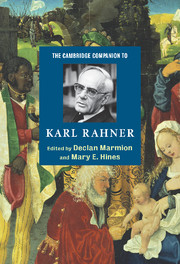Book contents
- Frontmatter
- Introduction
- Part I Spiritual, Philosophical, and Theological Roots
- Part II Theological Investigations
- 4 Method in theology
- 5 Revelation and faith
- 6 Trinity
- 7 Christology
- 8 Ecclesiology and ecumenism
- 9 Ministry and worship
- 10 Ethics
- 11 Eschatology
- Part III Conversations Ongoing
- Part IV Retrospect and Prospect
- Appendix
- Index
9 - Ministry and worship
from Part II - Theological Investigations
Published online by Cambridge University Press: 28 May 2006
- Frontmatter
- Introduction
- Part I Spiritual, Philosophical, and Theological Roots
- Part II Theological Investigations
- 4 Method in theology
- 5 Revelation and faith
- 6 Trinity
- 7 Christology
- 8 Ecclesiology and ecumenism
- 9 Ministry and worship
- 10 Ethics
- 11 Eschatology
- Part III Conversations Ongoing
- Part IV Retrospect and Prospect
- Appendix
- Index
Summary
Speaking at a conference on December 7, 1968 on questions concerning the diaconate, Karl Rahner stressed that while the ministerial office (Amt) of the Church must always be affirmed as one, its division into different ministerial offices is much more flexible than has been imagined, particularly over the last few centuries. Less than eight years later, in July 1976, focusing on the theme of the spirituality of the priest today, he highlighted the extraordinarily complex historical dimension of ministerial office that was always a part of his theological reflection. And the following year, 1977, in an article that first appeared in the journal Stimmen der Zeit, he reiterated that the multiplicity of ministerial offices in the Church are fundamentally rooted and draw their meaning as part of the Church's one ministerial office.
The 1966 lecture and publication, The Meaning of Ecclesiastical Office, is essential for understanding how Rahner views church ministry or ministerial office (kirchliches Amt). He explicitly states in the preface to the 1967 publication, Knechte Christi. Meditationen zum Priestertum, which was translated into English in 1968 as Servants of the Lord, that this lecture must be used as a hermeneutical key to interpret the essays, written over a thirty-year period, that have been collected in Knechte Christi. Ministerial office itself, he argues, can only be understood within the context of the fact that God has united God’s own self in a direct way with humanity, and that this unity is necessarily historically manifested.
- Type
- Chapter
- Information
- The Cambridge Companion to Karl Rahner , pp. 144 - 157Publisher: Cambridge University PressPrint publication year: 2005

